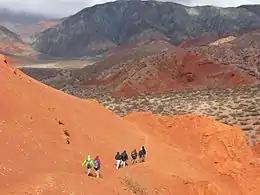Adventure travel
Adventure travel is a type of niche tourism, involving exploration or travel with a certain degree of risk (real or perceived), and which may require special skills and physical exertion. In the United States, adventure tourism has grown in recent decades as tourists seek out-of-the-ordinary or "roads less traveled" vacations, but lack of a clear operational definition has hampered measurement of market size and growth. According to the U.S.-based Adventure Travel Trade Association, adventure travel may be any tourist activity that includes physical activity, a cultural exchange, and connection with nature.[1]


Adventure tourists may have the motivation to achieve mental states characterized as rush or flow,[2] resulting from stepping outside their comfort zone. This may be from experiencing culture shock or by performing acts requiring significant effort and involve some degree of risk, real or perceived, or physical danger. This may include activities such as mountaineering, trekking, bungee jumping, mountain biking, cycling, canoeing, scuba diving, rafting, kayaking, zip-lining, paragliding, hiking, exploring, canyoneering, sandboarding, caving and rock climbing.[3] Some obscure forms of adventure travel include disaster and ghetto tourism.[4] Other rising forms of adventure travel include social and jungle tourism.
As a closely related subspecies of adventure travels, event trips involve various kinds of touristic travels that aim at particular activities as an important part of the travel, which don't necessary fulfil the criteria of being proper adventures. Activities comprised under the term "event trips" range from international sports events (i.e. FIFA World Cup, Super Bowl) to renowned cultural events (i.e. Bayreuth Festival, Venice Film Festival).
Access to inexpensive consumer technology, with respect to Global Positioning Systems, flashpacking, social networking and photography, have increased the worldwide interest in adventure travel.[5] The interest in independent adventure travel has also increased as more specialist travel websites emerge offering previously niche locations and sports.
Types
Accessible tourism
There is a trend for developing tourism specifically for the disabled. Adventure travel for the disabled has become a US$13 billion a year industry in North America.[6] Some adventure travel destinations offer diverse programs and job opportunities developed specifically for the disabled.[7]
Extreme tourism
Extreme tourism involves travel to dangerous (extreme) locations or participation in dangerous events or activities. This form of tourism can overlap with extreme sport.
Jungle tourism
Jungle tourism is a subcategory of adventure travel defined by active multifaceted physical means of travel in the jungle regions of the earth. According to the Glossary of Tourism Terms, jungle tours have become a major component of green tourism in tropical destinations and are a relatively recent phenomenon of Western international tourism.
Overland travel
Overland travel or overlanding refers to an "overland journey" – perhaps originating with Marco Polo's first overland expedition in the 13th century from Venice to the Mongolian court of Kublai Khan. Today overlanding is a form of extended adventure holiday, embarking on a long journey, often in a group. Overland companies provide a converted truck or a bus plus a tour leader, and the group travels together overland for a period of weeks or months.
Since the 1960s overlanding has been a popular means of travel between destinations across Africa, Europe, Asia (particularly India), the Americas and Australia. The "Hippie trail" of the 60s and 70s saw thousands of young westerners travelling through the Middle East to India and Nepal. Many of the older traditional routes are still active, along with newer routes like Iceland to South Africa overland and Central Asian post soviet states.
Notes and references
- "ATTA Values Statement" (PDF). adventuretravel.biz. Adventure Travel Trade Association. February 2013. p. 2. Retrieved 27 July 2015.
- Buckley, Ralf (2012). "Rush as a key motivation in skilled adventure tourism: Resolving the risk recreation paradox". Tourism Management. 33 (4): 961–970. doi:10.1016/j.tourman.2011.10.002. hdl:10072/46933.
- "Adventure Travel". Centers for Disease Control and Prevention. 26 April 2013. Retrieved 27 July 2015.
- "Citypaper online". Archived from the original on 13 October 2007. Retrieved 2007-11-10.
- The Development of Social Network Analysis Vancouver: Empirical Press.
- Stan Hagen – Tourism Minister of British Columbia
- The Equity: "Esprit rafting to be featured in commercial", Wednesday, May 14th, 2008, print edition
Further reading
- Buckley, R. (2006). Adventure Tourism. Wallingford, UK: CABI. OCLC 4802912392.
External links
 Media related to Adventure travel at Wikimedia Commons
Media related to Adventure travel at Wikimedia Commons- Scuba divers swim among the sharks, Fayetteville Observer